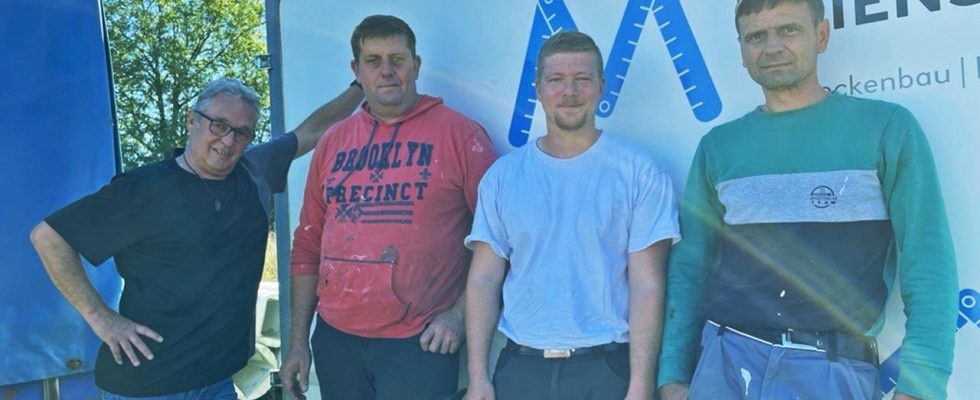The federal government wants to integrate more people with disabilities into the labor market. The numbers have recently gone down. Inclusion can succeed – as an example from the Eifel shows.
If Marcel Heinz has spent a working day filling plasterboard, he no longer knows how to do it the next day. It’s the same with everything he does. Marcel Heinz is 26 years old and has an intellectual disability. He cannot remember work processes for long and finds it difficult to concentrate.
Nevertheless, Heinz has been working full-time for a dry construction company in Hersdorf in the Eifel for more than a year. His boss Manfred Krämer says: “Marcel knows that he can ask any question, and as often as necessary.”
Marcel Heinz is not good at remembering work processes due to a disability. Nevertheless, he carries out all the work that arises in his company.
Inclusion requires intensive support
According to the entrepreneur, Marcel Heinz cannot be used alone. He always has someone by his side to guide him. Most of the time, company boss Krämer even does it himself. Marcel is only scheduled for activities that he is capable of, unskilled work that he can do well.
At the same time, however, Krämer does not want Marcel Heinz to only do what other employees may not like doing – sweeping or removing dirt. “Marcel is a big part of it, even if he can only do a quarter of what the other employees do,” says his boss.
Company boss Manfred Krämer (right) makes sure that Marcel Heinz carries out the same work as his colleagues.
funding programs offer chance
Together with 25 other young people, Marcel Heinz took part in a support program run by the Office for Social Affairs, the Federal Employment Agency and the Citizens Service Bitburg-Prüm. This paved the way for him to enter the primary job market. He consciously decided to follow this path instead of starting in a workshop for people with disabilities.
In the meantime he has a permanent job, and 75 percent of his gross wages are permanently subsidised. Marcel Heinz has not regretted the step to this day. He is happy in the company and likes the contact with his colleagues: “At the end of the day I like to see what I have achieved,” he says.
The transition is seldom successful
But examples like that from the Eifel are still rare. According to the Aktion Mensch, more than half of all special needs students switch to a workshop for people with disabilities. Some do an apprenticeship there, others do not learn a trade at all. The transition from a workshop for people with disabilities to the general job market is made every year by less than one percent.
“This situation urgently needs to change,” says Christina Marx, spokeswoman for Aktion Mensch. Independent living is made more difficult for people with disabilities, and valuable skilled workers are being lost from the general labor market. Germany cannot afford that in times of a shortage of skilled workers.
More than 160,000 people with disabilities unemployed
According to the Federal Employment Agency, the number of severely disabled people on the general labor market has increased continuously. However, the growth trend was stopped by the corona pandemic and has recently stagnated.
Last year, more than 160,000 people with disabilities were unemployed, the duration of unemployment was significantly longer than that of workers without disabilities, and the proportion of long-term unemployed was higher.
Social associations are demanding less bureaucracy
Verena Bentele, President of the social association VdK Deutschland eV, calls for companies to rethink the topic of inclusion. The law introduced by the government to promote an inclusive labor market contains “important impulses” and has laid a good foundation. It is correct that employers have to pay compensatory levies if they evade the obligation to employ severely disabled people.
However, Bentele emphasizes: “Around 45,000 employers who are obliged to work don’t even hire a single severely disabled person.” Applying for subsidies such as wage cost subsidies or financial aid to equip the workplace for disabled people is often “too complicated” and “too tedious”.
There are employers who definitely want to hire people with disabilities, but wait weeks for a reaction from the responsible integration office – and finally change their mind.
Above average qualified
Inclusion is definitely “a win for everyone,” says a spokeswoman for the Federal Ministry of Labor and Social Affairs. Because while there is a lack of qualified applicants in certain sectors and regions, many people with disabilities have above-average education.
On average in 2022, 54 percent of the severely disabled unemployed had a vocational or university degree. According to the ministry, it was 43 percent of the unemployed without disabilities. “Companies that think and act inclusively secure committed specialists and increase their attractiveness through a diverse corporate culture,” said the ministry spokeswoman.
commitment of individual employers
The fact is: In Germany, inclusion still depends on the commitment and will of individual companies. The head of the dry construction company in Hersdorf, Rhineland-Palatinate, Manfred Krämer, says that he hired Marcel Heinz because inclusion is a “heart matter” for him. He is aware that he invests a lot of his own time and energy.
Occasionally some colleagues even smiled at him. The entrepreneur then replies confidently: “Every day I spend with Marcel drives me to show everyone that it can work.”

